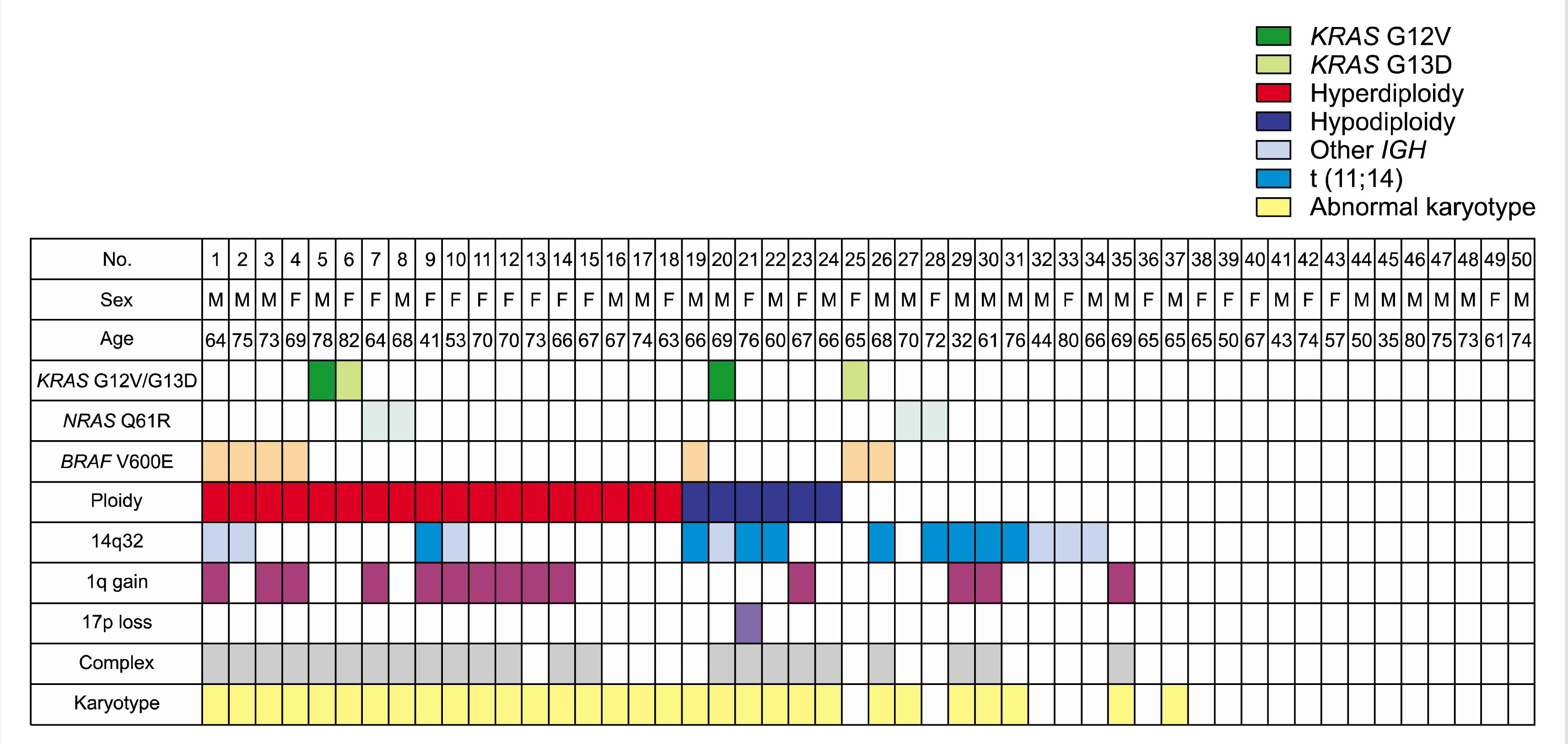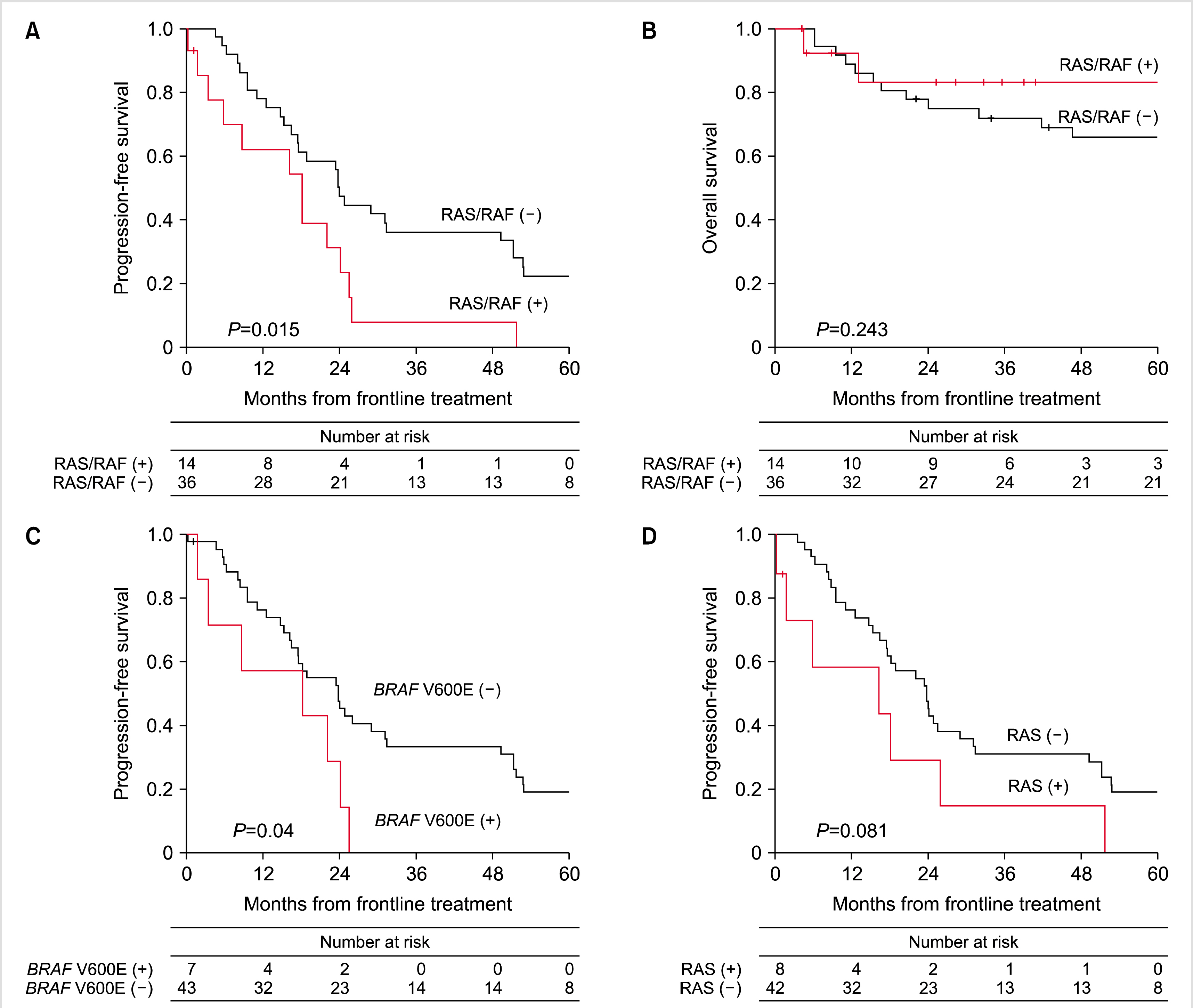Blood Res.
2020 Sep;55(3):159-168. 10.5045/br.2020.2020137.
KRAS, NRAS, and BRAF mutations in plasma cell myeloma at a single Korean institute
- Affiliations
-
- 1Department of Laboratory Medicine, College of Medicine, The Catholic University of Korea, Seoul, Korea
- 2Catholic Genetic Laboratory Center, Seoul St. Mary’s Hospital, College of Medicine, The Catholic University of Korea, Seoul, Korea
- 3Department of Hematology, Leukemia Research Institute, Seoul St. Mary's Hematology Hospital, College of Medicine, The Catholic University of Korea, Seoul, Korea
- KMID: 2507056
- DOI: http://doi.org/10.5045/br.2020.2020137
Abstract
- Background
Plasma cell myeloma (PCM) is a genetically heterogeneous disease. The genetic spectrum of PCM has been expanded to mutations such as KRAS, NRAS, and BRAF genes in the RAS-RAF-MAPK pathway. In this study, we have evaluated the frequency of these mutations and their significance, including baseline characteristics and clinical outcomes.
Methods
We explored 50 patients who were newly diagnosed with PCM between 2009 and 2012 at a single Korean institute. Clinical and laboratory parameters were gathered through careful review of medical records. Mutation analysis was carried out using DNA from the bone marrow at the time of diagnosis. Pyrosequencing was performed to detect KRAS G12V,KRASG13D, and NRAS G61R. BRAF V600E was analyzed by allele-specific real-time PCR. Comparison of clinical and laboratory parameters was carried out according to those mutations.
Results
We identified 14 patients (28%) with activating mutations in the RAS-RAF-MAPK pathway (RAS/RAF mutations):KRAS (N=3), KRAS (N=4),BRAF (N=7), and both KRAS and BRAF (N=1). RAS/RAF mutations were more frequently observed in patients with complex karyotypes and showed poorer progression free survival (PFS). Specifically, the BRAF V600E mutation had a significantly negative impact on median PFS.
Conclusion
We first showed the frequency of RAS/RAF mutations in Korean patients with PCM. Screening of these mutations could be considered as a routine clinical test at the time of diagnosis and follow-up due to their influence on clinical outcome, as well as its potential as a therapeutic target.
Keyword
Figure
Reference
-
1. Chng WJ, Dispenzieri A, Chim CS, et al. 2014; IMWG consensus on risk stratification in multiple myeloma. Leukemia. 28:269–77. DOI: 10.1038/leu.2013.247. PMID: 23974982.
Article2. Fonseca R, Bergsagel PL, Drach J, et al. 2009; International Myeloma Working Group molecular classification of multiple myeloma: spotlight review. Leukemia. 23:2210–21. DOI: 10.1038/leu.2009.174. PMID: 19798094. PMCID: PMC2964268.
Article3. Bolli N, Avet-Loiseau H, Wedge DC, et al. 2014; Heterogeneity of genomic evolution and mutational profiles in multiple myeloma. Nat Commun. 5:2997. DOI: 10.1038/ncomms3997. PMID: 24429703. PMCID: PMC3905727.
Article4. Chapman MA, Lawrence MS, Keats JJ, et al. 2011; Initial genome sequencing and analysis of multiple myeloma. Nature. 471:467–72. DOI: 10.1038/nature09837. PMID: 21430775. PMCID: PMC3560292.5. Smith D, Armenteros E, Percy L, et al. 2015; RAS mutation status and bortezomib therapy for relapsed multiple myeloma. Br J Haematol. 169:905–8. DOI: 10.1111/bjh.13258. PMID: 25580780.6. Andrulis M, Lehners N, Capper D, et al. 2013; Targeting the BRAF V600E mutation in multiple myeloma. Cancer Discov. 3:862–9. DOI: 10.1158/2159-8290.CD-13-0014. PMID: 23612012.
Article7. Pasca S, Tomuleasa C, Teodorescu P, et al. 2019; KRAS/NRAS/BRAF mutations as potential targets in multiple myeloma. Front Oncol. 9:1137. DOI: 10.3389/fonc.2019.01137. PMID: 31709194. PMCID: PMC6821642.
Article8. Cheung CHY, Cheng CK, Lau KM, et al. 2018; Prevalence and clinicopathologic significance of BRAF V600E mutation in chinese multiple myeloma patients. Clin Lymphoma Myeloma Leuk. 18:e315–25. DOI: 10.1016/j.clml.2018.05.008. PMID: 29807803.9. Lionetti M, Barbieri M, Todoerti K, et al. 2015; Molecular spectrum of BRAF, NRAS and KRAS gene mutations in plasma cell dyscrasias: implication for MEK-ERK pathway activation. Oncotarget. 6:24205–17. DOI: 10.18632/oncotarget.4434. PMID: 26090869. PMCID: PMC4695180.
Article10. Lohr JG, Stojanov P, Carter SL, et al. 2014; Widespread genetic heterogeneity in multiple myeloma: implications for targeted therapy. Cancer Cell. 25:91–101. DOI: 10.1016/j.ccr.2013.12.015. PMID: 24434212. PMCID: PMC4241387.11. Davies H, Bignell GR, Cox C, et al. 2002; Mutations of the BRAF gene in human cancer. Nature. 417:949–54. DOI: 10.1038/nature00766. PMID: 12068308.12. Walker BA, Boyle EM, Wardell CP, et al. 2015; Mutational spectrum, copy number changes, and outcome: results of a sequencing study of patients with newly diagnosed myeloma. J Clin Oncol. 33:3911–20. DOI: 10.1200/JCO.2014.59.1503. PMID: 26282654. PMCID: PMC6485456.
Article13. Leich E, Steinbrunn T. 2016; RAS mutations - for better or for worse in multiple myeloma? Leuk Lymphoma. 57:8–9. DOI: 10.3109/10428194.2015.1065984. PMID: 26430811.
Article14. Chng WJ, Gonzalez-Paz N, Price-Troska T, et al. 2008; Clinical and biological significance of RAS mutations in multiple myeloma. Leukemia. 22:2280–4. DOI: 10.1038/leu.2008.142. PMID: 18528420. PMCID: PMC3864109.
Article15. Samatar AA, Poulikakos PI. 2014; Targeting RAS-ERK signalling in cancer: promises and challenges. Nat Rev Drug Discov. 13:928–42. DOI: 10.1038/nrd4281. PMID: 25435214.
Article16. Greipp PR, San Miguel J, Durie BG, et al. 2005; International staging system for multiple myeloma. J Clin Oncol. 23:3412–20. DOI: 10.1200/JCO.2005.04.242. PMID: 15809451. PMCID: PMC4846284.17. Rajkumar SV, Dimopoulos MA, Palumbo A, et al. 2014; International Myeloma Working Group updated criteria for the diagnosis of multiple myeloma. Lancet Oncol. 15:e538–48. DOI: 10.1016/S1470-2045(14)70442-5. PMID: 25439696.18. Jekarl DW, Min CK, Kwon A, et al. 2013; Impact of genetic abnormalities on the prognoses and clinical parameters of patients with multiple myeloma. Ann Lab Med. 33:248–54. DOI: 10.3343/alm.2013.33.4.248. PMID: 23826560. PMCID: PMC3698302.
Article19. McGowan-Jordan J, Simons A, Schmid M, editors. 2016. ISCN 2016: an International System for Human Cytogenomic Nomenclature (2016). S. Karger;Basel, Switzerland: DOI: 10.1159/isbn.978-3-318-05979-3.20. Mulligan G, Lichter DI, Di Bacco A, et al. 2014; Mutation of NRAS but not KRAS significantly reduces myeloma sensitivity to single-agent bortezomib therapy. Blood. 123:632–9. DOI: 10.1182/blood-2013-05-504340.
Article21. Park SJ, Sun JY, Hong K, et al. 2013; Application of BRAF, NRAS, KRAS mutations as markers for the detection of papillary thyroid cancer from FNAB specimens by pyrosequencing analysis. Clin Chem Lab Med. 51:1673–80. DOI: 10.1515/cclm-2012-0375. PMID: 23585181.
Article22. Bolli N, Biancon G, Moarii M, et al. 2018; Analysis of the genomic landscape of multiple myeloma highlights novel prognostic markers and disease subgroups. Leukemia. 32:2604–16. DOI: 10.1038/s41375-018-0037-9. PMID: 29789651. PMCID: PMC6092251.
Article23. Rasmussen T, Kuehl M, Lodahl M, Johnsen HE, Dahl IM. 2005; Possible roles for activating RAS mutations in the MGUS to MM transition and in the intramedullary to extramedullary transition in some plasma cell tumors. Blood. 105:317–23. DOI: 10.1182/blood-2004-03-0833. PMID: 15339850.
Article24. Zingone A, Kuehl WM. 2011; Pathogenesis of monoclonal gammopathy of undetermined significance and progression to multiple myeloma. Semin Hematol. 48:4–12. DOI: 10.1053/j.seminhematol.2010.11.003. PMID: 21232653. PMCID: PMC3040450.
Article25. Liu P, Leong T, Quam L, et al. 1996; Activating mutations of N- and K-ras in multiple myeloma show different clinical associations: analysis of the Eastern Cooperative Oncology Group Phase III Trial. Blood. 88:2699–706. DOI: 10.1182/blood.V88.7.2699.bloodjournal8872699. PMID: 8839865.
Article26. Gebauer N, Biersack H, Czerwinska AC, et al. 2016; Favorable prognostic impact of RAS mutation status in multiple myeloma treated with high-dose melphalan and autologous stem cell support in the era of novel agents: a single center perspective. Leuk Lymphoma. 57:226–9. DOI: 10.3109/10428194.2015.1046863. PMID: 25947035.27. Wong KY, Yao Q, Yuan LQ, Li Z, Ma ESK, Chim CS. 2018; Frequent functional activation of RAS signalling not explained by RAS/RAF mutations in relapsed/refractory multiple myeloma. Sci Rep. 8:13522. DOI: 10.1038/s41598-018-31820-9.
Article28. Rashid NU, Sperling AS, Bolli N, et al. 2014; Differential and limited expression of mutant alleles in multiple myeloma. Blood. 124:3110–7. DOI: 10.1182/blood-2014-04-569327. PMID: 25237203. PMCID: PMC4231420.
Article29. Long GV, Menzies AM, Nagrial AM, et al. 2011; Prognostic and clinicopathologic associations of oncogenic BRAF in metastatic melanoma. J Clin Oncol. 29:1239–46. DOI: 10.1200/JCO.2010.32.4327. PMID: 21343559.
Article30. Chapman PB, Hauschild A, Robert C, et al. 2011; Improved survival with vemurafenib in melanoma with BRAF V600E mutation. N Engl J Med. 364:2507–16. DOI: 10.1056/NEJMoa1103782. PMID: 21639808. PMCID: PMC3549296.31. Hauschild A, Grob JJ, Demidov LV, et al. 2012; Dabrafenib in BRAF-mutated metastatic melanoma: a multicentre, open-label, phase 3 randomised controlled trial. Lancet. 380:358–65. DOI: 10.1016/S0140-6736(12)60868-X. PMID: 22735384.32. Weißbach S, Heredia-Guerrero SC, Barnsteiner S, et al. 2020; Exon-4 mutations in KRAS affect MEK/ERK and PI3K/AKT signaling in human multiple myeloma cell lines. Cancers (Basel). 12:455. DOI: 10.3390/cancers12020455. PMID: 32079091. PMCID: PMC7072554.
Article33. Liu P, Wang Y, Li X. 2019; Targeting the untargetable KRAS in cancer therapy. Acta Pharm Sin B. 9:871–9. DOI: 10.1016/j.apsb.2019.03.002. PMID: 31649840. PMCID: PMC6804475.
Article34. Minnie SA, Hill GR. 2020; Immunotherapy of multiple myeloma. J Clin Invest. 130:1565–75. DOI: 10.1172/JCI129205. PMID: 32149732. PMCID: PMC7108923.
Article35. Kim K, Lee JH, Kim JS, et al. 2014; Clinical profiles of multiple myeloma in Asia-An Asian Myeloma Network study. Am J Hematol. 89:751–6. DOI: 10.1002/ajh.23731. PMID: 24723430.
Article
- Full Text Links
- Actions
-
Cited
- CITED
-
- Close
- Share
- Similar articles
-
- Prevalence of BRAF and NRAS Mutations and a Comparative Analysis in Primary and Metastatic Melanoma of Korean Patients
- Targeting BRAF pathway in low-grade serous ovarian cancer
- SOLITARY PLASMA CELL MYELOMA ON ANTERIOR MAXILLA: A CASE REPORT
- Treatment Effect of Combining Lenvatinib and Vemurafenib for BRAF Mutated Anaplastic Thyroid Cancer
- Plasma Cell Myeloma: A Report of 2 Cases



